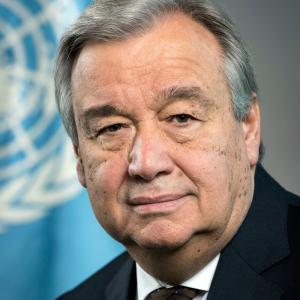THE SECRETARY-GENERAL -- REMARKS TO GENERAL ASSEMBLY EVENT IN COMMEMORATION OF HIS HOLINESS POPE FRANCIS
New York, 29 April 2025
[Trilingual, as delivered]
Excellencies, ladies and gentlemen,
His Holiness Pope Francis was a man of faith — and a bridge-builder among all faiths.
He was a champion of the most marginalized people on earth.
He was a voice of community in a world of division…
A voice of mercy in a world of cruelty…
A voice of peace in a world of war.
And he was a steadfast friend of the United Nations, addressing Member States from this very podium in 2015.
During that historic visit, he also spoke of our organization’s ideal of a “united human family living in harmony, working not only for peace, but in peace, working not only for justice, but in a spirit of justice.”
On behalf of our UN family, I extend by deepest condolences to the Catholic community and to so many others around the world grieving this tremendous loss.
Excellencies,
Pope Francis was at the helm of the Roman Catholic Church for a dozen years — but that was preceded by decades of service and good works.
As a young man, Pope Francis found his calling in the slums of Buenos Aires, where his dedication to serving the poor earned him the title “Bishop of the Slums.”
These early experiences sharpened his conviction that faith must be an engine of action and change.
Pope Francis put that engine into overdrive as an unstoppable voice for social justice and equality.
His 2020 encyclical, Fratelli Tutti, drew a straight line between greed and poverty, hunger, inequality and suffering.
While decrying the inequality that defines our globalized economy, he also warned against what he called “globalization of indifference.”
I will never forget the first official visit he undertook as Pope, at a time when I served as High Commissioner for Refugees.
Pope Francis chose to go to the Mediterranean island of Lampedusa in 2013 — to put a global spotlight on the desperate plight of asylum seekers and migrants.
He warned against “the culture of comfort, which makes us think only of ourselves, makes us insensitive to the cries of other people.”
And on last year’s World Refugee Day, he called on all countries “to welcome, promote, accompany and integrate those who knock on our doors.”
When I met with him at the Vatican as Secretary-General in 2019, I was struck by his humanity and his humility.
He always saw challenges through the eyes of those on the peripheries of life.
And he said we can never look away from injustice and inequality — or close our eyes to those suffering from conflict or acts of violence.
Always a pilgrim for peace, Pope Francis ventured to war-torn countries around the world — from Iraq to South Sudan to the Democratic Republic of Congo and beyond — decrying bloodshed and violence, and pushing for reconciliation.
He stood with conviction for innocents caught in war zones such as Ukraine and Gaza.
He did it with his global platform — but he also did it in much more personal and profound ways.
Every day without fail, precisely at 7:00 p.m., he would quietly call the Church of the Holy Family in Gaza City.
As someone at the Church said, “He would ask us how we were, what did we eat, did we have clean water, was anyone injured? It was never diplomatic or a matter of obligation. It was the questions a father asks to their son.”
And in his final message on Easter Sunday, Pope Francis underscored the vital importance of ending these conflicts.
Jusqu’au bout, le pape François aura incarné l’appel à la justice – pour les peuples et pour la planète.
Grâce à son encyclique Laudato Si publiée en 2015, il a contribué à l’adoption de l’Accord de Paris en appelant les dirigeants à protéger « notre maison commune ».
Il a également mis en évidence les liens manifestes entre la dégradation de l’environnement et la dégradation de la condition humaine.
Le pape François comprenait que ceux qui avaient le moins contribué à la crise climatique en subissaient les conséquences les plus graves – et que nous avons le devoir spirituel et moral d’agir.
Excelencias:
En el mundo actual de división y discordia, es particularmente significativo que el Papa Francisco haya proclamado 2025 como el año de la esperanza.
Él fue siempre un mensajero de esperanza.
Ahora nos corresponde a todos nosotros llevar adelante esta esperanza.
En su funeral del sábado, me conmovió profundamente ver a líderes de todas las religiones y tendencias políticas unirse en solidaridad para honrar la vida y los logros del Papa Francisco – un raro espíritu de unidad y reflexión solemne que necesitamos ahora más que nunca.
Nuestro mundo sería un lugar mucho mejor si siguiéramos su ejemplo de unidad, compasión y comprensión mutua a través de nuestras propias palabras y acciones.
Mientras lloramos la muerte del Papa Francisco, renovemos nuestro compromiso con la paz, la dignidad humana y la justicia social – las causas a las que dedicó cada momento de su extraordinaria vida.
Muchas gracias.
Speech by


















